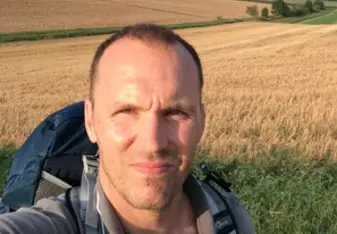What has inspired you to pursue a career in study abroad?
When I first entered the field of international education, I was working as a foreign credentials evaluator in Miami. Though I learned a lot in that position, I knew that I ultimately wanted to work in an academic setting and play a significant role in programming and delivering study abroad experiences.
The role of a resident director is invigorating because the position requires an affinity for detailed planning, organizing well in advance, administering, overseeing, anticipating, troubleshooting, presenting, fear-soothing, and of course educating – all bundled under one sizeable hat.
Also, I was always strongly drawn to the idea of working in a bilingual setting, and study abroad – especially in the capacity of resident director - certainly requires full fluency in both German and English. And once you’ve done that, I imagine it would be difficult wanting to work again in a monolingual setting.
Why is cultural immersion important to you?
Because without true cultural immersion, you’re never leaving your original identity and comfort zone. And critical thinking – about yourself, how you see the world, how other parts of the world see your home country, how you judge situations and events – benefits tremendously when we have a set of comparative experiences.
Looking back on my time as a student in Austria, there were times when my beliefs were challenged and downright destroyed, but when you are open to immersion and change you become less concerned with “being right” than with doing good.
And working in international education is doing good because education is about selfless, honest giving and not taking – there is no negative byproduct of international education. You simply share knowledge and experience and enable growth through immersion. And for me personally, study abroad is not so much about a checklist of places to see – it’s more about empowerment of young people through their cross-cultural experiences.
What was your favorite travel experience?
Kristopher: People are usually surprised when I tell them that I am not a big fan of travel. I like to pick out a favorite spot (German-speaking Europe) and then develop a routine, get to know the terrain, the people, and then go from there.
Right now all three of my daughters are still very young, so I am going through school again, so to speak, now the German way. So I guess you could say my life here is extended travel. It's just not at all vacation mode. It's much, much deeper, and that is what interests me.
And to be honest, I enjoy traveling in the US. It's such a huge country with so much diversity on so many levels. You have mountains, desert, rolling hills, swamps, beaches, forests, fields, cities and suburbs.
And then you have so many different kinds of people, so many different foods. Many things are much different than here in Europe, though of course with lots of similarities as well.
What is the best story you’ve heard from a student of your program after they’ve returned to the USA?
One of my former students is currently working on her doctoral degree in German, and she wrote me recently to thank me and BCA for the amazing experience we provided her. She wrote me that of all the colleagues she knows, she is the only one who spent a significant amount of time completing academic work in two German-speaking countries (our two-month pre-semester prep takes place in Vienna, Austria). It’s great to know that our arrangements here give our students an advantage like that.
I’ve also had students return to Germany and Austria as, for example, Fulbright scholars, and they sometimes write me to thank me for all the work I did to make their stay so smooth. There is a lot of red tape to cut when moving into a foreign country, but I enjoy making that as invisible and painless as possible for our students.
What positive changes do you notice in your students during their time studying abroad?
Just a couple weeks ago we had our end-of-semester final academic advising sessions, and it was very motivating to hear them talk about their time here.
I don’t recall any of them going on about how easy things were, but they were really proud of their accomplishments, and that is the empowerment I always hope for with my students as resident director.
Once you have found yourself in situations where you need to make decisions on your own and you need to be able to function more or less independently of family and friends for a few months, growth is going to take place. And it’s this growth and empowerment that make my work here so exciting.
The German language is of course a component in all this, but only one component, and you can forget your German over time. But the rest of the lessons learned here are life-long and very powerful, very positive.

